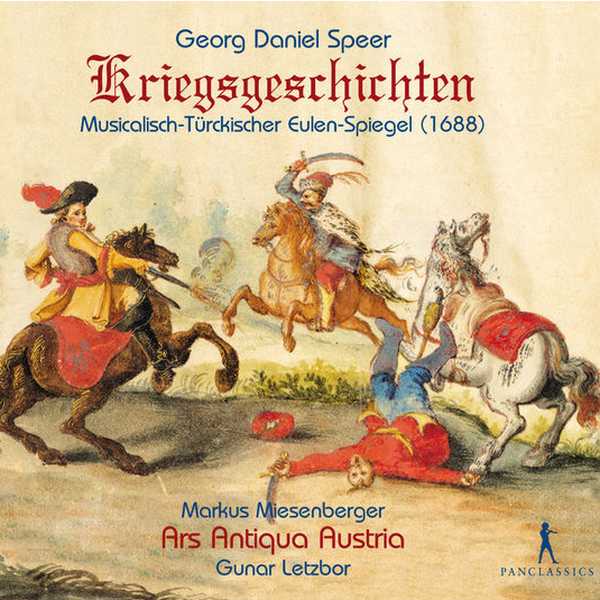
Composer: Georg Daniel Speer
Performer: Markus Miesenberger, Ars Antiqua Austria
Conductor: Gunar Letzbor
Format: FLAC (tracks)
Label: Pan Classics
Catalogue: PC10317
Release: 2016
Size: 251 MB
Recovery: +3%
Scan: yes
Musikalisch-Türkischer Eulen-Spiegel
01. Intrada: Wer etwas neues horen will
02. Kosaken Ballet
03. Sonata 27
04. Moskowitisch Ballet: Lompyn kommt, treibt mehr und grobere Possen
05. Pohlnisch Ballet
06. Sonata 26
07. Hungarisch Ballet: Lompyn zog dem Vezier nach
08. Wallachisches Ballet
09. Sonata 28
10. Kosaken Ballet: Die Potentaten, die werben Soldaten
11. Griechisch Ballet
12. Sonatina 39
13. Gigue 40
14. Sarabanda 41
In the year 1688, when the 52-year-old Georg Daniel Speer, son of a reputed peltmonger family of Breslau, had his ‘Musicalisch-Türckischer Eulen-Spiegel’ published in Ulm, he was an organist and assistant teacher in South Germany and already had an eventful life behind him. At the age of 18, he had set off through the Carpathian Mountains to Spisz (located in the north-east of present-day Slovakia). Throughout the following years, he worked as a mercenary for various armies, once as an army drummer, then as a bugler in the war of Hungary against the Turks. Finally, he reached Constantinople in the company of a ‘high-born lord’. In his ‘Musicalisch-Türckischer Eulen-Spiegel’, Speer sets texts from his picaresque novel ‘Ungarischer oder Dacianischer Simplicissimus’ in music. Speer lets his hero Lompyn travel musically through all the countries then affected by the Turkish invasion. To this effect, the versatile composer created dances and melodies in the style of each of these almost exotic peoples. From the large number of stories, Gunar Letzbor, the leader of Ars antiqua Austria, chose two CD-filling programmes: the present CD with ‘War Stories’ of our hero Lompyn and his ‘Love Adventures’, which are due to appear on a second CD in 2017. In the ‘War Stories’ mentioned, we experience the rough time of the Turkish wars from the point of view of a simple man who is trying to survive the most dangerous of situations, ideally without any noteworthy scratches. With cunning and humour, he is able to survive dangerous attacks but also refuses to cringe in the face of substantial ribaldry and incivility. At the end, the hero ponders the absurdity of war.



